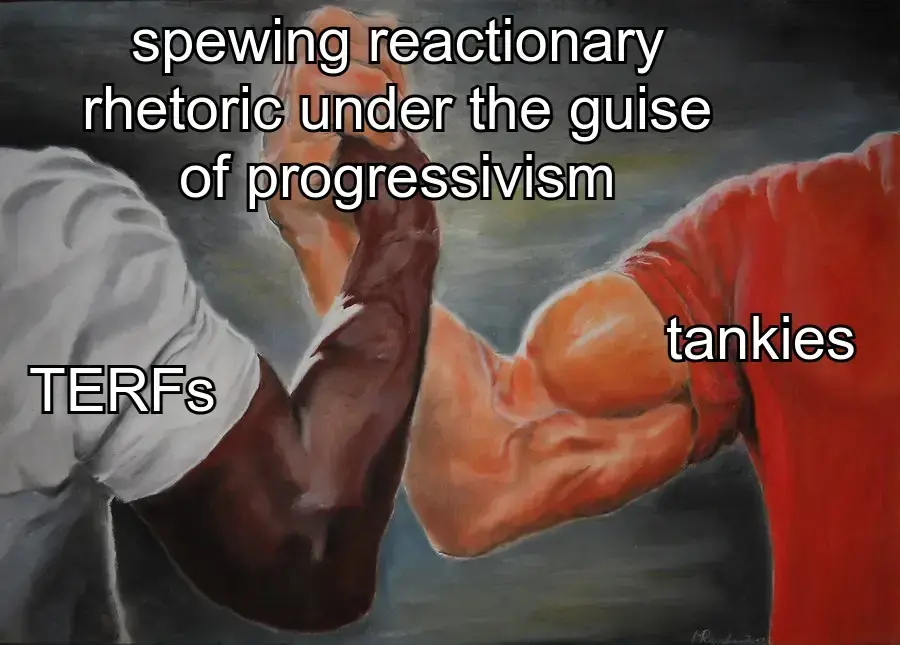this post was submitted on 09 Sep 2023
548 points (84.9% liked)
Political Memes
6051 readers
2710 users here now
Welcome to politcal memes!
These are our rules:
Be civil
Jokes are okay, but don’t intentionally harass or disturb any member of our community. Sexism, racism and bigotry are not allowed. Good faith argumentation only. No posts discouraging people to vote or shaming people for voting.
No misinformation
Don’t post any intentional misinformation. When asked by mods, provide sources for any claims you make.
Posts should be memes
Random pictures do not qualify as memes. Relevance to politics is required.
No bots, spam or self-promotion
Follow instance rules, ask for your bot to be allowed on this community.
founded 2 years ago
MODERATORS
you are viewing a single comment's thread
view the rest of the comments
view the rest of the comments

But, the ‘they have (non-marginal) differences but should be treated equally’ is the problem.
If there are differences that matter, those should be considered.
If there aren’t differences that matter, it doesn’t make sense to ‘care’ what gender you are.
The two categories of people covered by ‘TERF’ for instance would seem to interpret your referenced study as supporting and opposing their views.
(In practice, I understand that it basically never matters if someone is a man or a woman but upside of specific situations, mostly involving physical attraction. But I also just don’t ‘get’ why people try to create a ‘he’ or ‘she’ identity. I don’t really care if they do… it just seems like a contradiction.)
Equality doesn't necessarily mean treating the exact same. For example equality for somebody in a wheelchair might mean giving them equal access to a place by installing a ramp, not giving them the same access via the stairs as those who don't need a wheelchair use.
You can acknowledge differences and do different things with those in mind to attain equality.
I think what you're describing is equity of opportunity, not strictly equality, but that's semantics.
The problem isn't that there's differences between genders, but the assumption that 1) all people of a certain gender will think or act in accordance with the trends of their gender and 2) that the differences between genders means that one is better suited to certain tasks than the others.
For 1, while the behavior of men and women follows certain trends on a large scale, if you pick a random individual from each gender, they're likely to be as similar or different from each other as if you had selected two people of the same gender. So when you're doing something on an individual basis, like hiring for a position or electing someone to office, the average differences between the genders really doesn't matter and should not inform your decision more than the person's individual characteristics.
For 2, there's an assumption that there's exactly one type of person suited to a particular role, and that type of person is more likely to be of one particular gender. This assumption is false, though, as true innovation is not spurred by having a group of like-minded people, but by bringing a variety of viewpoints and personalities together so that problems can examined from every angle. Diversity in general ensures better coverage of an issue's potential pitfalls and a larger pool of knowledge and experience, so hiring from one gender because they're "naturally good at this kind of thing" is really only limiting the potential of the group.
I think your post makes my point well, actually. If the differences between people of a gender is so wide spread as to not matter in a personal level, it seems silly to be highly offended if you are referenced as the wrong gender. If someone calls one of us a brunette or blonde, I don’t think anyone would take great offense because it just doesn’t matter… gender seems like the same rule should apply.
Humans aren't logical machines. What makes sense is rarely the key to how we work. We have a whole unconscious mind that decides a lot of how we behave.
How we externalise gender is mostly down to how we are raised, society and the media. How we feel about it is down to our brain.
If we weren't raised with such a big divide between boys and girls these problems wouldn't be anywhere near as big of a deal.
If people didn't receive hate and judgment based on how they expressed it I doubt many people would care as much.
But you would still have things like gender body dysmorphia where the brain can't deal with the physical body.